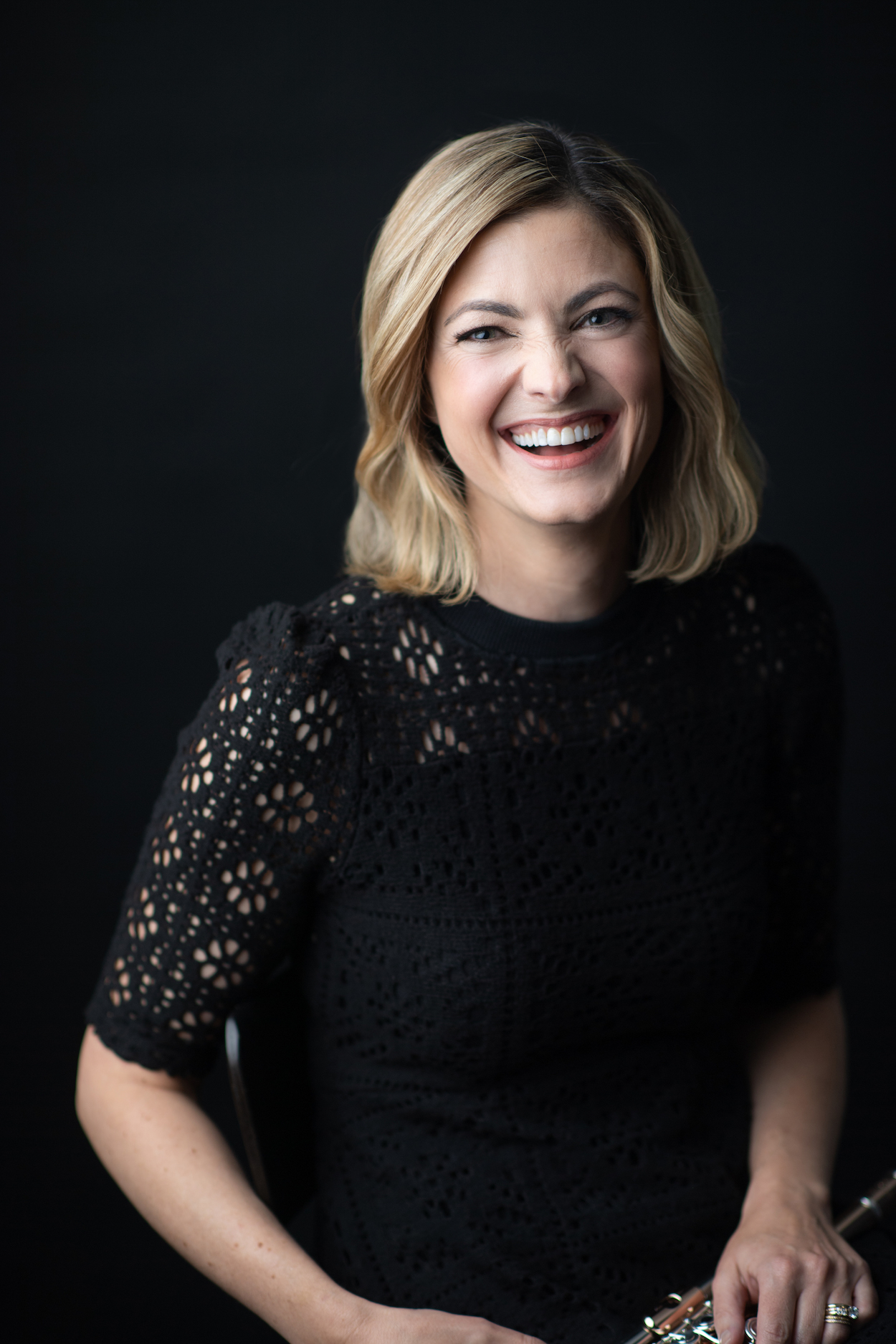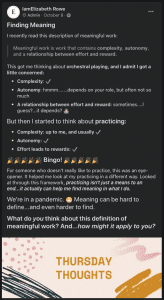
Empowering Community & Creativity - Part II of a conversation with Elizabeth Rowe
The completion of a two-part interview with principal flutist of the Boston Symphony Elizabeth Rowe, well known as a performer, mentor, and advocate for equal pay in the orchestral world. I greatly enjoyed connecting with Elizabeth earlier this fall and sharing her inspiring thoughts regarding her approach to the pandemic, as a performer and a human being, and for advice to others on healthily managing their own reactions to it.
If you missed it, be sure to check out Part I of her interview!
In this second part of a condensed version of our conversation, Elizabeth discusses how her desire to support musicians early in their careers and creative people of all fields and stages of life has driven her to explore some new outlets. While recognizing that this is a privilege afforded to her by her position in the Boston Symphony, Elizabeth feels fortunate to have found space during this time to develop her other interests and find ways to uplift others. She also acknowledges that she has also had periods of struggling and looking for answers, and that it’s okay and normal to not have found a great new calling during this pandemic! Already becoming increasingly involved in advocacy and mentorship work, Elizabeth feels lucky that she was already on the path to having something besides music in her life.
For a long time, Elizabeth has felt passionate about supporting musicians in their first decade after finishing music school, as this time period for everyone is filled with many choices, challenges, and opportunities.
Some of my most gratifying conversations over the last several years have been with former students or early professional musicians with whom I have crossed paths at Tanglewood or at the New World Symphony. I have loved the opportunity to support them as they navigate the many life choices they face.
This drove her to start the Facebook community Seeing Beyond the Notes soon after lockdowns started this year. Though not a huge fan of Facebook or Social Media in general, Elizabeth created and facilitates this online community with the goal of providing a space for discussion and making it okay to have a conversation about our shared challenges or the subjects that musicians don’t often acknowledge.
The community we’ve created is shaped by and dependent on the needs of its members. It’s all about the people who are in the group, what they’re interested in, what they want to talk about, how they want to show up for each other, the kinds of subjects they feel are relevant.
My role is to provide a framework of topics and ideas, and then to let people’s minds move in whatever direction they’re inspired to from there. I just step back and see where the discussion goes. I might open a door to an idea, but the group members are the ones who walk through it.
One post this fall that seemed particularly honest and relevant discusses the challenge of finding meaning in our work.

Elizabeth’s goal with the community is to provide an environment for musicians to let go of their learned inclinations to judge themselves and desire to be “perfect,” and to empower everyone to connect with their most authentic self.
We are in a profession that prioritizes perfection, and peak performance, and a polished presentation. This can be valuable when we’re on stage presenting a piece of music, but this mindset sometimes sets us up to apply those standards too harshly, and to all aspects of our lives. Too much perfectionism and self-criticism can turn into debilitating self-judgement.
There’s an important distinction between observing yourself as an artist in order to discover opportunities for growth, versus judging yourself. There’s a difference between “my phrasing here isn’t yet convincing” versus “I am unmusical.” Or “I wiped out on that technical passage” versus “I am a failure.” Observation can help us assess what is occurring, where harsh judgment often shows up in statements about who you are.
We often get caught up judging ourselves, when we would be better served by simply observing. This is true whether we are thinking about our playing, or our patterns as a human being. Sometimes, this combination of perfectionism and judgement leads us to wall ourselves off from other people to protect ourselves. This can then cause us to develop a way of being in the world where we don’t allow ourselves to be seen for who we really are (and sometimes don’t really see others, either) because everyone is operating in these little bubbles of perfectionism.
She discusses this more in her TedxTalk “The Lonely Onlys”, and places special emphasis on how acknowledging your own imperfections can lead to developing empathy and enabling connections with others around you.
Empathy is one of the most powerful tools to build community, to find people with whom you feel a connection. Empathy comes from understanding someone else’s human experience and finding a piece of it that resonates with yourself. It turns out that many of the most powerful moments of empathy arise from sharing our failures or setbacks. Our ability to expose our flaws, to allow ourselves to be seen and to see others, can provide meaningful connection. We may not understand all of what someone is going through, but we might understand one little piece of it–and that one little moment of empathy is all that it takes to feel connected.
The desire to empower others on their paths to self-discovery and to connect with larger communities has also driven Elizabeth to develop a coaching practice for creatives of all types, which to her feels completely distinct from her other work.
Unlike teaching or mentoring where she offers expertise from her field, Elizabeth sees her role as a coach as being a thinking-partner, listening to people who desire to move forwards but may find themselves stuck, and asking questions to help them open a door that they may not have seen on their own.
Coaching is facilitating, thinking together, providing a space to be deeply listened to and to explore what is possible. Most of us rarely, if ever, experience how transformative it can be to be listened to in this way. Good coaching helps us identify and clarify our own thought patterns. It helps us overcome those stubborn habits that keep us stuck and frustrated, and helps us move our lives in the direction that we want to go.
She loves working with people of all ages and in all fields, focusing on the “whole person” as they search for creative solutions and strive to make changes in their personal and professional lives.
It’s a joy to do this work with people across all walks of life. The same roadblocks, frustrations, and negative voices that musicians experience exist everywhere else too. We all have so much in common, once we get past the surface, “resume,” piece of who we are.
This is the work I’m called to do. My whole life has brought me to this point where I’m now able to support people in a powerful way that builds on, and goes far beyond, what I can do as a flutist.
Just as she emphasizes that letting go of perfectionism, while extremely challenging, helps to develop empathy and build community, Elizabeth also recognizes the importance of failure and believes her own past experiences, though not always pleasant, now help her to provide insight as a coach.
All of the things that we perceive as failures at the time – auditions that didn’t go our way, relationships that fall apart, choices we regret – in the moment they are difficult and painful, and they don’t feel like anything we would ever consider to be an asset. But over time these experiences can become something truly valuable we can offer to ourselves and to others.
We gain wisdom and insight from all those setbacks. Failure is part of being a human being. Acknowledging this allows for human-to-human connection and empathy, because nobody gets through life without failures! This is all easy to say in hindsight, of course, and nearly impossible to feel in the moment, but eventually those failures can shift into something meaningful.
She discusses this in more depth as a guest in MIT’s FAIL! – Inspiring Resilience live-chat series.
As she continues to form new connections, Elizabeth hopes to inspire everyone to release themselves from self-judgement, in their professional lives as well as their personal lives.
My hope in the Facebook group, and in my other work, is to encourage us to find connection with each other as fully dimensional human beings, and to empathize with each other over the good and the bad, the shared struggles, flaws, uncertainties, and doubts that we all have, as well as the celebrations and successes.
And as we all continue to find our ways forwards, as musicians and simply as humans striving to navigate a pandemic, I want to repeat one thought shared in the first part of Elizabeth’s interview:
It’s really important to understand that everybody is going to experience this in their own way, and there’s not a right way to go about this.
Be kind to yourself.
For more on Elizabeth and what’s driving her right now, make sure you read Part 1 of this interview, sign up for her occasional newsletter, or visit her at www.iamelizabethrowe.com.

Elizabeth Rowe is the principal flutist of the Boston Symphony Orchestra. She is a professional coach, a teacher, a social justice advocate, and a public speaker. After she took a stand to demand equal pay from her employer in 2018, The Boston Globe honored her as a Bostonian of the Year, calling “The Fighter.” Her ongoing commitment to opening up dialogue about complex subjects led to her TEDx talk, The Lonely Onlys, where she shared her personal story of learning to embrace the powers of imagination and vulnerability to create connection and community. Elizabeth’s coaching practice supports creative people of all types as they work to achieve their biggest vision for their personal and professional lives, while remaining true to themselves.

Double Bassist Andrea Beyer is an avid performer, teacher and advocate for using music as a tool for social growth. As an orchestral musician, Andrea has performed in concerts at Carnegie Hall and Lincoln Center, as well as national halls in Central and South America and Asia. A fellow at the New World Symphony from 2017-2020, she gained a passion for creative concert design when she conceived of and presented concerts geared towards new audiences, including “Face-off: Battle of the Instruments” and “Music from Beyond the Wall.”
Outside of the orchestral world, Andrea is a passionate teacher and is on the faculty of Bass Works, a summer double bass program in Baltimore, Maryland. She is also the Public Relations Director and a Workshop Coordinator for the MusAid Organization, which supports music programs in under-resourced countries with volunteer music teaching workshops. Andrea holds a Bachelors Degree from Oberlin Conservatory where she studied with Thomas Sperl and a Masters Degree from Yale University where she studied with Don Palma.
Currently based in Austin, Texas, you can connect with Andrea at andreabeyerbass.com or find her on Instagram @wandering_bassline.

